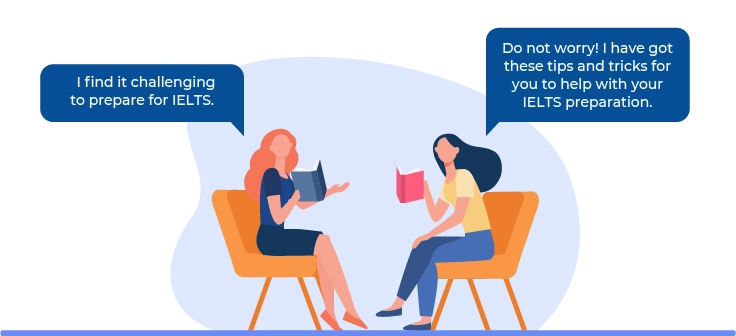
There are many English proficiency exams out there, but IELTS is the most popular and widely accepted one. The International English Language Testing System (IELTS), introduced by the British Council, IDP Education and Cambridge, is taken by many students to pursue higher education abroad.
IELTS assesses the language ability of non-native speakers in an academic setting. Then, according to the need by the universities or visa processing, candidates can apply for different levels of exams such as General Training and Academic Training.
IELTS Exams comprise four sections, namely listening, speaking, reading and writing. Each section has a different number of questions, patterns and duration. In order to ace the IELTS exam in all these sections, you need to be fully prepared to face any scenarios thrown at you. Hence, here are some tips and tricks that will help you prepare better for the IELTS exam.
The IELTS exam is conducted in two different formats - Academic and General Training. The former has an essay writing section with four prompts, while the latter has no essay but tests your vocabulary knowledge from reading passages. Academic IELTS is taken by those who wish to pursue higher studies abroad. On the other hand, those people usually take General IELTS wishes to get work experience or migrate abroad.
Some preparation tips and tricks generally applicable to all forms of IELTS exams are as follows:
Prepare and allot time to practice more efficiently to improve yourself. See that you understand your skill level and aim to enhance that by bridging the proficiency gap. Once you have completed your learning preparation, go through the Tips To Do A Day Before Your IELTS Exam.
The first section of an IELTS exam is the listening section, which comprises 40 questions to be completed within 30 minutes. The question types differ from multiple-choice, short answer, matching, sentence completion, etc.
Some listening section tips that can help you score better are as follows:
Even though the IELTS writing section is different for Academic and General forms, the duration and number of questions stay the same, 60 minutes and two questions. In the first writing task, candidates must write at least 150 words in 20 minutes, and for the second writing task, they must write at least 250 words in 40 minutes.
To have a much more efficient approach to the writing section, the following preparation tips can be helpful:
IELTS Speaking section that holds a duration of 11 to 14 minutes assesses your use of spoken English. In an interview format, the examiner will start with general questions and further discuss a particular topic.
You will have Several Mistakes to Avoid in the Speaking section. Hence, follow the following preparation tips to perform better in the exam:
In Conclusion
To prepare well for the IELTS exam and obtain a good score, you need to know what areas are being tested. When it comes to preparation tips, there is no one-size-fits-all plan that will work for everyone. The best way to make sure you are prepared is by following your strengths and weaknesses. Continue your education with NIOS Courses in Dubai.
There are several tips for IELTS Preparation. Looking for one? Polish your Skill with our IELTS Coaching. Each section is crafted to test your skills and proficiency in the English language. Only through rigorous preparation and dedication can you score good marks in the IELTS exam. You must believe in yourself and set the goal to pass the IELTS on your first try by using the preparation tips we have provided.
See also : Planning to take your IELTS test in Dubai?.Book your test at an official IELTS test centre. For more details check out our IELTS Exam Booking Page.

DHA, NCLEX
Blessy is an experienced medical instructor who specialises in Prometric courses and NCLEX preparation. She has a wealth of knowledge in healthcare education and is highly skilled in teaching and training healthcare professionals. Her main aim is to support students in passing their Prometric exams and NCLEX certification by providing them with comprehensive and up-to-date study materials, personalised instruction, and hands-on practice exams.
Blessy's teaching approach centers on creating a supportive and engaging learning environment that encourages critical thinking, problem-solving skills, and effective test-taking strategies. She is committed to professional development and keeping up-to-date with the latest trends and advancements in the medical field. As part of her commitment, she regularly attends workshops, conferences, and seminars to enhance her expertise, ensuring that her students receive the most relevant and valuable education.
